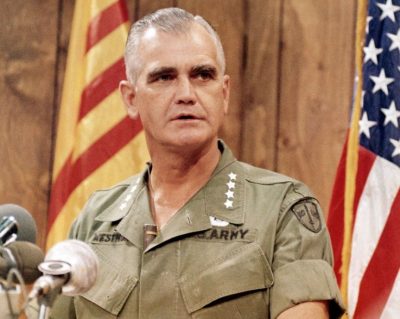Fear of Defeat and the Vietnam War

Fear of defeat drives military men to folly. Early in 1968, General William Westmoreland, America’s commanding general in Vietnam, feared that communist forces might overrun U.S. military positions at Khe Sanh. His response, according to recently declassified cables as reported in the New York Timestoday, was to seek authorization to move nuclear weapons into Vietnam. He planned to use tactical nuclear weapons against concentrations of North Vietnamese Army (NVA) troops. President Lyndon Johnson cancelled Westmoreland’s plans and ordered that discussions about using nuclear weapons be kept secret (i.e. hidden from the American people), which for the last fifty years they have been.
Westmoreland and the U.S. military/government had already been lying to the American people about progress in the war. Khe Sanh as well as the Tet Offensive of 1968 were illustrations that there was no light in sight at the end of the tunnel — no victory loomed by force of arms. Thus the call for nuclear weapons to be deployed to Vietnam, a call that President Johnson wisely refused to countenance.
Westmoreland’s recourse to nuclear weapons would have made a limited war (“limited” for U.S. forces, not for the Vietnamese on the receiving end of U.S. firepower) unlimited. A nuclear attack in Vietnam likely would have been catastrophic to world order, perhaps leading to a much wider war in Asia that could have led to world-ending nuclear exchanges. But Westmoreland seems to have had only Khe Sanh in his sights: only the staving off of defeat in a position that American forces quickly abandoned after they had “won” the battle.
War, as French leader Georges Clemenceau famously said, is too important to be left to generals. Generals often see the battlefield in narrow terms, seeking victory at any price, if only to avoid the stain of defeat.
But what price victory if the world ends as a result?
*
Note to readers: please click the share buttons above. Forward this article to your email lists. Crosspost on your blog site, internet forums. etc.
Featured image: General William Westmoreland in 1968 (Stars and Stripes)

